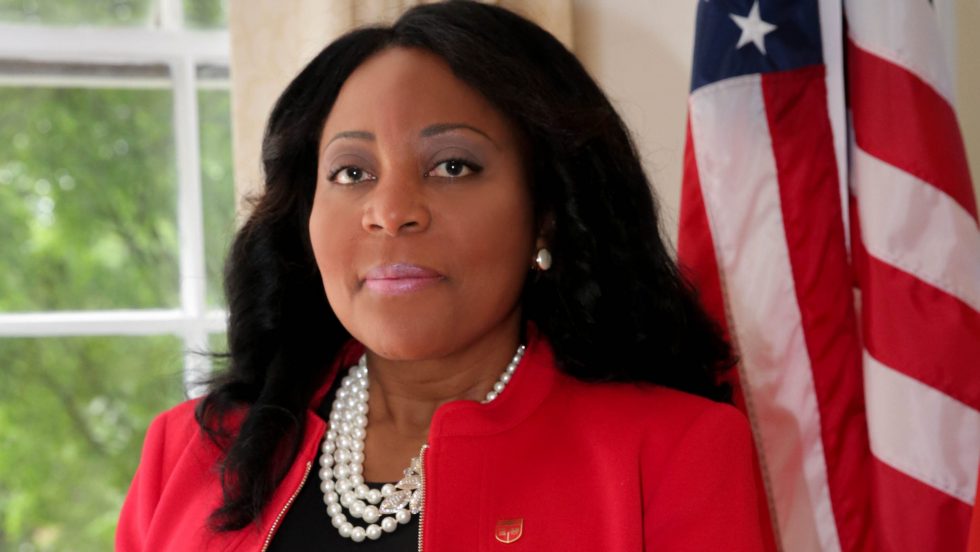
Francine Conway, PhD ’99, said her “training at Adelphi is a gift that keeps on giving.” She’s using the skills she learned from her mentors, George Stricker, PhD, former dean, and Kirkland Vaughans, PhD ’85, clinical director and supervisor, in her roles as the chancellor-provost and the first Black dean of Rutgers University-New Brunswick’s Graduate School of Applied and Professional Psychology (GSAPP).
Dr. Conway, who earned her Doctor of Philosophy in clinical psychology at the Gordon F. Derner Institute for Advanced Psychological Studies, also served on the faculty for 13 years and was Derner department chair from 2013 to 2016. While she was at Adelphi, she launched Adelphi’s Research Conference in 2003 to celebrate students’ research, as well as the Emerging Scholars Program, the selective, yearlong undergraduate research program for junior and senior psychology majors. With Dr. Vaughans, she established the ongoing Derner Hempstead Child Clinic, “the most gratifying work I’ve ever done,” she said.
Dr. Conway is a clinical psychologist and researcher who has treated children in hospital settings and private practice for more than 20 years. Her work on the psychodynamic treatment of children with ADHD earned international recognition. But she gives credit for her accomplishments to the mentoring she got from the colleagues she called “my two parents in this professional life.”
Dr. Stricker, who was her dissertation chair, has been a pivotal factor in helping her develop career milestones, she said. “He was critical in terms of helping me to get to certain places as a professional and in my research, getting me involved in the Gerontological Society of America, and he has published with me, supported me in all the ways that a mentor should,” she said. “When I graduated, he kept that connection, always asking if I was happy doing what I’m doing and where I was in my journey. It was a very special relationship. George was just a singular kind of person who had this ability to see things in me that I didn’t even imagine for myself. He was the one who suggested I apply to a faculty position at Adelphi.”
She said that working with Dr. Stricker led her down the path of specializing in aging, but she credits her second mentor and clinical supervisor, Dr. Vaughans, for leading her to child psychopathology.
“He’s a big influence on me in terms of the psychodynamic and psychoanalytic world,” she said. “He brought me on as a research editor for the journal that he founded, Journal of Infant, Child, and Adolescent Psychotherapy. It served me well in my career, and that journal is thriving and doing amazing things.”
While at Adelphi, Dr. Conway began working on a book, Cultivating Compassion, Psychodynamic Understanding of ADHD. She said her experience of creating the Derner Hempstead Child Clinic led to her interest in developing GSAPP’s ADHD Compassion Project for children diagnosed or presenting with symptoms of attention deficit hyperactivity disorder and for their families.
“When I came to Rutgers, it was a good opportunity for me to put into practice some of the things I had been writing about,” she said.
Dr. Conway maintains that without her chair experience at Adelphi, she wouldn’t have been a good dean. “Luckily, at Adelphi, I had faculty who were just so supportive. That’s where I got my administrative training, in such a nurturing environment.”
She also calls on her Adelphi experiences in her role as chancellor-provost and added that the opportunity to participate in University-wide initiatives “really prepared me for the next chapter in my life, to go into that deanship. It’s because I was able to work with the provost’s office at Adelphi to do things around enrollment management and high-impact practices.”
Dr. Conway said she was happy at Adelphi, but she was drawn to GSAPP, where she has since led the school in developing new academic graduate, certificate and nondegree programs, resulting in a 35 percent increase in enrollment. She also created programs to support faculty research, including a grants office that has doubled the rate of faculty grant submissions and resulted in federal grant increases that have improved the school’s financial position.
But even at GSAPP, there is a connection to Derner, as she said that the School’s first dean, Donald Peterson, PhD, worked with Dr. Stricker to start the schools of professional psychology. “It was very powerful for me to be able to come to Rutgers to see George’s vision implemented,” she said.
Dr. Conway said that the training she got at Adelphi, with an emphasis on the psychoanalytic/psychodynamic, has helped her as an administrator “to be more tolerant and forgiving of people’s idiosyncrasies and to understand their motivations, other than what is apparent, but at the same time, it helps me to understand what things are workable for me as a supervisor and what things are not.
“I think I couldn’t do this job without my Derner training,” she said. “It was at Derner that I entered into my own psychoanalysis, resulting in a long-term therapeutic relationship that has transformed my life. Adelphi was a challenging environment, where I was the only person of color in my class, and I learned from that experience. As a faculty member, it was both challenging and very nurturing in some ways—overall, a perfect place for me to launch, to build up my internal confidence and my sense of self so that I can go into the world and do what I’m doing now.”